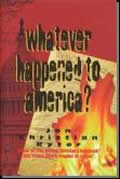Other
Ryter
Articles:
The Two Kerry's:
War Hero or
Traitor?
"Men in Black" The Cult of The Judges
DEMOCRATS
DEAL BLOW TO C.A.F.T.A.
By Jon Christian Ryter
May 13, 2005
NewsWithViews.com
The Bush Administration was dealt a major political setback to win Congressional approval for the Central America Free Trade Agreement [CAFTA] after a group of pro-free trade Democratic allies in the House of Representatives suddenly backed out of the deal. Surprising, it had nothing to do with the battle being waged in the US Senate over judicial nominees. It has to do with the AFL-CIO Industrial Union Council protecting the collective bargaining rights of Central American workers. After all, someone has to watch out of for the jobs of tomorrow's consumers.
It would seem that if the AFL-CIO had not sold out to the globalists for a seat at the feast-laden table of the New World Order in 1993, between 2.5 to 4 million jobs would have remained in the United States. And the American labor unions would have continued to represent the American workers. The American worker was sacrificed as much by their labor unions as industry when the North American Free Trade Agreement was pushed through Congress by the Clinton Administration. If you recall, in 1994, the Democrats were rewarded for NAFTA by losing control of both the House and Senate. It would do the Republican Party good to keep that thought in mind when CAFTA comes up for a vote since America now understands that CAFTA, like NAFTA, was never a jobs for Americans proposition, it has always been a jobs transfer bill that was specifically designed to place income in the hands of tomorrow's consumers in the third world at the expense of Americans.
The House New Deal Coalition, which traditionally supports trade deals announced that it was withdrawing its support because the AFL-CIO said that the terms of the trade agreement did not put sufficient pressure on the Central American governments to create American-style collective bargaining rights for the workers that were guaranteed by the respective governments of Central America and, if necessary, backed up with troops to support the workers' rights to strike.
Congresswoman Ellen Tauscher [D-CA], chair of the New Democrat Coalition, said: "We are ardent supporters of free trade, but this deal reduces our ability to enforce labor standards." It seems to me that, in reality, the only people the New Democrats really want to protect are the labor unions themselves who discovered their "right" to unionize all of the jobs going to Mexico did not mean much without collective bargaining laws that favored them. Tauscher, who has signed on as a willing partner of the continued American jobs drain�if the GOP agrees to force collective bargaining rights on the governments of Central America who accept the new American factories�wins whether CAFTA is enacted or not. If it is, she keeps the support of big labor and will be re-elected. If it fails, Bush gets the blame and she becomes part of the party that opposed the jobs drain.
Congressman Adam Smith [D-WA], an ardent free-trader, has become luke warm on CAFTA because, he said, the Caribbean Basin Initiative (the trade agreement now in effect) can be rescinded by Congress at will if the governments of Central America do not improve labor relations upon demand where CAFTA, once enacted, cannot be rescinded. The safeguards can be repealed, but CAFTA cannot be reversed. CAFTA, in its current form does not have the mechanism attached to put sufficient pressure on those governments to improve workers' rights. The AFL-CIO is making sure it does not repeat its NAFTA mistakes�sanctioning the jobs drain from America on the understanding that all of the factories transferred from the United States were theirs to unionize�but without Taft-Hartley or any other Rooseveltian-labor law that guaranteed them collective bargaining rights and binding arbitration that forced industry to negotiate terms that favored labor.
The Bush Administration countered that the International Labor Organization considers Central America's labor laws to be generally in line with core universal labor standards around the world. Under CAFTA, the only option is to fine nations that fail to enforce international labor standards. The fine is $15 million per infraction. Money seized through fines is sent to that nation's Labor Ministry for use to improve labor standards in that country.
Bush Administration Agriculture Secretary Mike Johanns has attempted to deflect the fact that CAFTA, like NAFTA, is a jobs drain bill that will remove even more American factories from the United States and transplant them in the impoverished nations in the Caribbean which possess few consumer products because they lack the means to buy them (where the US market, like those in the other industrial nations, have reached 99.99% saturation and have become replacement buyers rather than first time buyers). Johanns told the media that CAFTA is important to the United States because it will lower the steep Central American tariffs on US farm products. At least the Bush people aren't stupid enough to try to convince out-of-work Americans that CAFTA will create more jobs in the United States. However, there was still something wrong with his argument. Free trade agreements are supposed to be just that�tariff free.
Would someone please explain to this West Virginia hillbilly what America gets out of this deal if our Central American trading partners get to slap tariffs on American goods going into those nations, but products made in their countries at the expense of the American work force can be returned to America for sale in American retail outlets without tariffs that protect the manufacturers who have remained loyal to the American people?
On May 10 Congressman Michael Michaud [D-ME] held an anti-CAFTA rally outside of the Capitol. Several members of Congress, labor leaders�who, of course, benefit extremely if CAFTA is amended to force Central American governments to provide binding arbitration rights to striking workers�and hundreds of union members who were shipped in to serve as a "working man backdrop" for the photo-op by the AFL-CIO, echoed their protest to the passage of CAFTA. "Today," Michaud said, "we are in front of the Capitol Building�a symbol of prosperity and hope�to tell President Bush that we are sick and tired of waving from the shores as one more job is being outsourced. We are here to tell him that it's time to get off the fast track of lost jobs and shattered dreams and onto the right track of fair trade and more opportunities." Trade promotion authority�fast tracking�does not permit Congress to amend treaties. CAFTA, however, is a trade agreement that originated in the United States Congress in 2001.
Until it passes both houses of Congress, is signed by the President and is ratified by our trading partners, it is simply just one more bad piece of legislation that is designed to increase the global consumer-base for the world's transnational merchants, bankers and industrialists who are engineering the global economy at the expense of the American wage-earner (which, of course, is why the AFL-CIO is lobbying so hard to add binding arbitration to the bill�they know that Michaud's statement is true only with respect to treaty ratifications). When a treaty�any treaty�is sent from the State Department to the Senate, the Senate is required to give it an up-or-down vote for ratification. If the President has a photo-op and signs a treaty before it is sent to the Senate for ratification, the treaty becomes legally-binding upon this nation even if the Senate rejects it�as it did with the Kyoto Protocol.
According
to the 17th century Law of the Nations (a treaty enacted by the
nations of Europe long before the fledgling British, French and Spanish
colonies in the New World became the United States), once the king,
president, prime minister or premier signs a treaty�even if it is not
approved by that nation's parliament or legislature�it becomes binding
upon that nation for all time. But at this moment, CAFTA can be killed.
As soon as the House and Senate leadership feels comfortable that they
can roll this albatross out onto the floor of both Houses for a voice
vote (neither house wants their fingerprints found on the "yea" button
since America knows�Johanns feeble excuse notwithstanding�CAFTA like
NAFTA was designed to provide American jobs to third world workers since
they are tomorrow's consumers. Tomorrow's human capital. Or, as Chevron
put it recently in one of their globalist green ads: people are human
energy. And, America is the fuel that be consumed to feed the fire of
the global economy.
� 2005 Jon C. Ryter - All Rights Reserved
Order Jon Ryter's book "Whatever Happened to America?"
Sign Up For Free E-Mail Alerts
E-Mails
are used strictly for NWVs alerts, not for sale
Jon Christian Ryter is the pseudonym of a former newspaper reporter with the Parkersburg, WV Sentinel. He authored a syndicated newspaper column, Answers From The Bible, from the mid-1970s until 1985. Answers From The Bible was read weekly in many suburban markets in the United States.
Today, Jon is an advertising executive with the Washington Times. His website, www.jonchristianryter.com has helped him establish a network of mid-to senior-level Washington insiders who now provide him with a steady stream of material for use both in his books and in the investigative reports that are found on his website.
E-Mail: BAFFauthor@aol.com
...it is simply just one more bad piece of legislation that is designed to increase the global consumer-base for the world's transnational merchants, bankers and industrialists who are engineering the global economy at the expense of the American...











